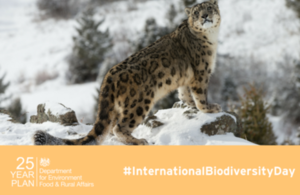Darwin Initiative: £10 million for international conservation projects
The Darwin Initiative will fund 52 projects around the globe sharing £10.6 million and delivering commitments in the 25 Year Environment Plan.

(Photo credit: Getty Images)
On International Day for Biological Diversity (22 May) the UK Government has announced the latest round of successful funding bids from the Darwin Initiative to deliver on flagship commitments set out in the 25 Year Environment Plan.
Environment Secretary, Michael Gove, awarded a total package of £10.6 million to 52 projects over the next three years from across the globe that will support and enhance biodiversity.
Since 1992, the Darwin Initiative has funded 1,055 projects from 159 countries, with a value of £140m.
Environment Secretary, Michael Gove said:
International Day for Biological Diversity offers an important moment for us all to consider how we can help the natural environment thrive on our planet.
Through the Darwin Initiative, we are driving change to protect and enhance international biodiversity. Our 25 Year Environment Plan has set the priorities for funding and demonstrates the UK’s global leadership.
Darwin Initiative
The Darwin Initiative is a grants scheme that helps to protect biodiversity and the natural environment around the globe. Many of the applications reflect the UK Government’s 25 Year Environment Plan commitments to protect the marine environment, to secure the benefits of biodiversity for the poorest communities, and to help prevent the extinction of species.
The fund is administered by the Department for the Environment, Food and Rural Affairs (Defra) and uses the UK Government’s Official Development Assistance.
Projects receiving funding include:
‘Biodiversity and Agriculture: addressing scale insect threats in Kenya’ and led by the Natural History Museum.
Sir Michael Dixon, Director of the Natural History Museum, said:
The role of the Natural History Museum is to inform debate, empower better decisions and lead progress in natural science – sustaining and improving life on Earth. The funding we have received through the Darwin Initiative is allowing us to do just that.
We have participated in 44 Darwin-funded projects to date, from fellowships and awards to major projects. The latest funding is allowing us to collaborate with expert partners in Kenya to help communities better identify, target and respond to invasions of scale insects. These pests damage native trees and crops in Kenya and can cause up to 91 per cent of crop losses but often pesticides are misapplied, damaging both crop yields and the environment. This project will empower communities to improve agricultural practices and protect the nature around them.
Snow Leopard Conservancy has been given support for sustaining snow leopard conservation through strengthened local institutions and enterprises.
Director of the Snow Leopard Conservancy, Dr Rodney Jackson said:
Nepal is adopting the new Federal Constitution aimed at devolving more powers to the local municipality level, thereby giving local communities a greater role in biodiversity conservation.
The Darwin Initiative support comes at the perfect time, enabling the Snow Leopard Conservancy and partners to greatly expand important grassroots, community-driven actions benefiting the snow leopards, known by some as the Ghost of the Mountains, in two of Nepal’s most important mountain protected areas.
Another project is ‘Andean bears and people: coexistence through poverty reduction’ and is being led by Chester Zoo.
Dr Alexandra Zimmermann, Head of Conservation Science at Chester Zoo, said:
Through the support from the Darwin Initiative we will be able to facilitate human-bear coexistence in the southern Bolivian Andes. Our project links poverty reduction and benefits from biodiversity conservation by improving livelihoods and wellbeing of communities who live alongside this threatened species.
A full list of projects, including a number of small schemes, to be supported by the Darwin Initiative is available on gov.uk
Latest support
The Darwin Initiative and the Illegal Wildlife Trade Challenge Fund have both re-opened for the next round of applications for funding. Projects are being encouraged that support the commitments in the UK Government’s 25 Year Environment Plan.
For the first time the IWT Challenge Fund will provide funding for projects schemes aimed at the illegal trade in certain species of flora around the globe.
Professor Kathy Willis, Director of Science, Royal Botanic Gardens, Kew said:
We welcome this announcement on International Day of Biological Diversity of new resources to help address and reduce the illegal trade in important plant species. This trade has been having a devastating impact on plant diversity in many parts of the world.
Kew’s State of the World’s Plants report last year published that 31,517 plant species are currently listed on the CITES appendices and of these 334 are considered critically threatened by international trade. This funding is therefore coming at a vital moment for plant scientists to be able to act and do more to protect orchids, cacti and cycads in particular against this growing threat.
In October 2018, the UK will host a fourth international conference on the illegal wildlife trade, bringing global leaders to London to tackle the strategic challenges of the trade. This follows the ground breaking London 2014 conference on the illegal wildlife trade, and subsequent conferences in Botswana and Vietnam.
Updates to this page
Published 22 May 2018Last updated 22 May 2018 + show all updates
-
Added additional links to the list of projects and corrected a minor typo
-
First published.